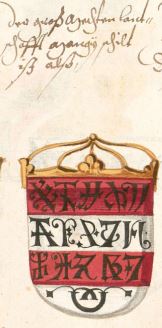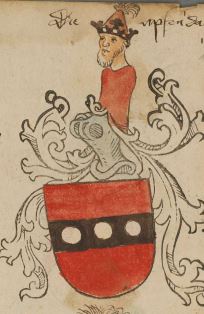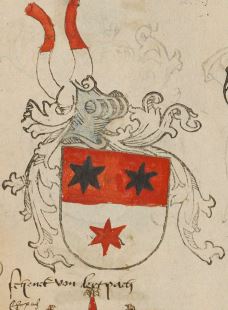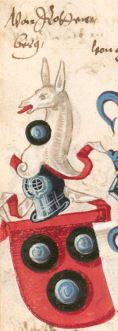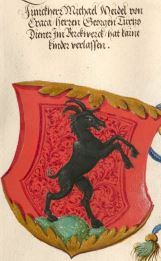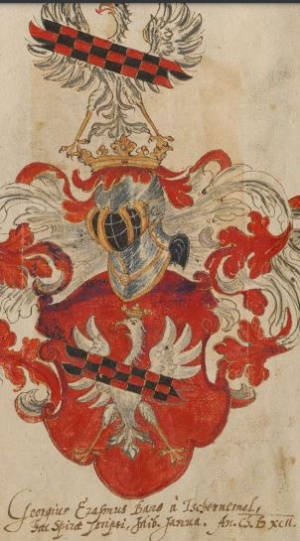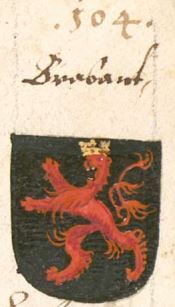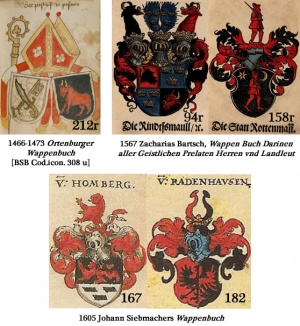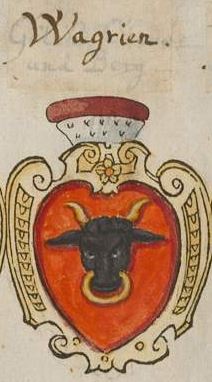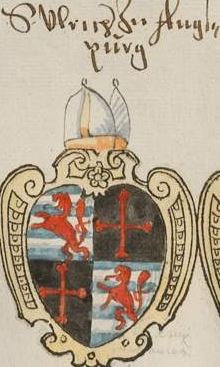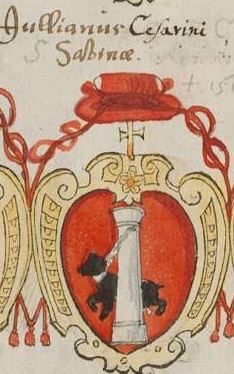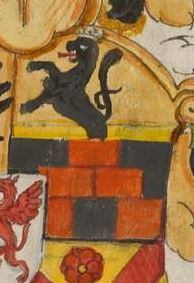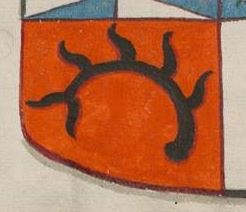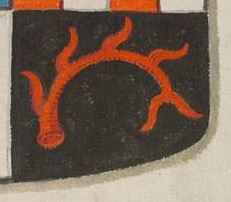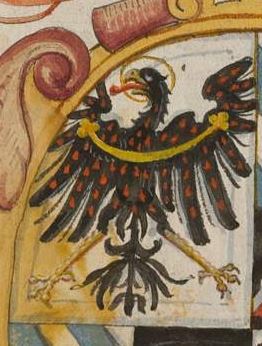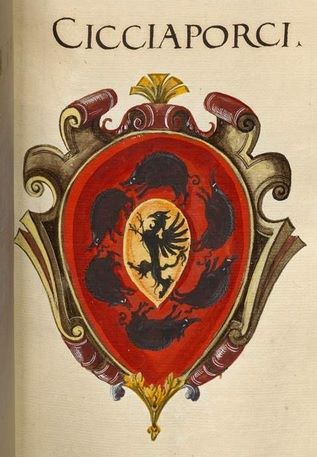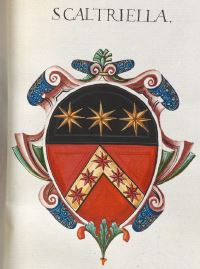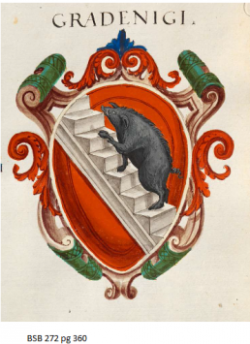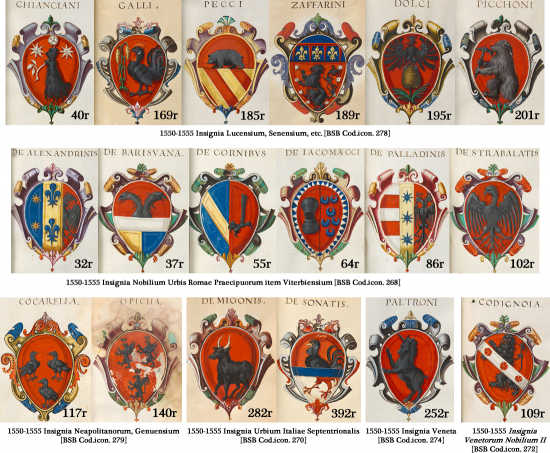Gules and Sable: Difference between revisions
| (97 intermediate revisions by 2 users not shown) | |||
| Line 1: | Line 1: | ||
'''WARNING: Do not cite this page as a reference. This page is on this | '''WARNING: Do not cite this page as a reference. This page is on this wiki only to make the content "searchable" and easier to find. If you find the information you seek here, go to the original sources to verify the information and use them for your documentation.''' | ||
---- | ---- | ||
=Basic Information:= | =Basic Information:= | ||
Many combinations of gules and sable (red and black), especially gules on sable and sable on gules, would be considered low [[ | Many combinations of gules and sable (red and black), especially gules on sable and sable on gules, would be considered low [[Contrast]]and would be un-registerable using the Core Style rules. | ||
They would have to be registered as an [[Individually Attested Pattern]] formerly known as a Regional Style Exception. | They would have to be registered as an [[Individually Attested Pattern]] formerly known as a Regional Style Exception. | ||
See SENA - | See SENA - http://heraldry.sca.org/sena.html#A4|http:''heraldry.sca.org/sena.html#A4 | ||
---- | ---- | ||
Blog with collection of IAP submissions from January 2007 through October 2020 - http://blog.heraldicart.org/catalog-of-iap-submissions/ | |||
=Period Examples:= | =Period Examples:= | ||
Regional Exceptions to the Rule of Tincture, Vol. 01 - | |||
https://www.facebook.com/notes/sca-heraldry-chat/regional-exceptions-to-the-rule-of-tincture-vol-01/10150677670804203 | |||
Regional Exceptions to the Rule of Tincture, Vol. 02 - | |||
https://www.facebook.com/notes/sca-unofficial-heraldic-consultation/regional-exceptions-to-the-rule-of-tincture-vol-02/10150837743659203/ | |||
Form to add new examples to the Tincture IAP Spreadsheet: | [https://docs.google.com/spreadsheet/ccc?key=0AsKqJkKo3DKgdDdxMEdBeHhhREpycS1PWjEtd05DMmc&usp=sharing Tincture IAP Spreadsheet] | ||
* Form to add new examples to the Tincture IAP Spreadsheet: | |||
* [https://docs.google.com/forms/d/1PGElgT_98WQK-HksxXOpbqc8SN6EPXXTJ-fvigbA0M8/viewform?usp=send_form#start=invite Form to add new period tincture examples] | * [https://docs.google.com/forms/d/1PGElgT_98WQK-HksxXOpbqc8SN6EPXXTJ-fvigbA0M8/viewform?usp=send_form#start=invite Form to add new period tincture examples] | ||
"Heraldry in Gules and Sable" - http://sigrdrifa1.deviantart.com/art/Heraldry-in-Gules-and-Sable-326465631 | |||
== | ==Anglo-French:== | ||
Nothalten, a municipality in the canton of Barr in France: Gules a bear sable on a trimount issuant from base vert, maintaining an anchor with the top forming the numeral 4 Or. http://fr.wikipedia.org/wiki/Nothalten | |||
{| class="wikitable" | {| class="wikitable" | ||
| [[File:BSB291_f35r_16th_Bodyam.jpg|Insignia]] | | [[File:BSB291_f35r_16th_Bodyam.jpg|Insignia]] | ||
| [[File:BSB291_36r_Cobelegh.jpg|Insignia]] | | [[File:BSB291_36r_Cobelegh.jpg|Insignia]] | ||
| [[File:BSB291_f44v_Eng16thC_Matthew.JPG| | | [[File:BSB291_f44v_Eng16thC_Matthew.JPG|150px]] | ||
|- | |- | ||
| Insignia Anglica, 16th c. BSB 291, f35r, Bodyam | | Insignia Anglica, 16th c. BSB 291, f35r, Bodyam | ||
| Line 33: | Line 38: | ||
|} | |} | ||
Academy of Saint Gabriel report 1991 ( | Academy of Saint Gabriel report 1991 ( http://www.s-gabriel.org/1991) gives a few examples of low-contrast gyronny: | ||
*Mathison (1639) Gyronny sable and gules a lion rampant Or [4]; | *Mathison (1639) Gyronny sable and gules a lion rampant Or [4]; ... | ||
*Guild of Coopers (1509) Gyronny sable and gules on a chevron between three annulets Or a royne between two broad axes azure, and on a chief vert three lilies argent [5]; | *Guild of Coopers (1509) Gyronny sable and gules on a chevron between three annulets Or a royne between two broad axes azure, and on a chief vert three lilies argent [5]; [see below for illustrations] | ||
*Nisbet, Alexander, _A System of Heraldry_ (Edinburgh: T.A. Constable, 1984), v.1, p.198. | *Nisbet, Alexander, _A System of Heraldry_ (Edinburgh: T.A. Constable, 1984), v.1, p.198. | ||
*Bromley, John, and Heather Child, _The Armorial Bearings of the Guilds of London_ (New York: Frederick Warne & Co. Inc., 1960). | *Bromley, John, and Heather Child, _The Armorial Bearings of the Guilds of London_ (New York: Frederick Warne & Co. Inc., 1960). | ||
== | {| class="wikitable" | ||
| [[File:WorshipfulCompanyofCoopers1596LUNA-FolgerSTC26018-gules&sablegyronny,etc.png]] | |||
| [[File:WorshipfulCompanyofCoopers-gules&sablegyronny,etc.png]] | |||
|- | |||
| The armes of all the cheife corporatons [sic] of England, 1596 English (LUNA: Folger Digital Image Collection, STC 26018) | |||
| Modern rendition of coat of arms of the Guild of Coopers | |||
|} | |||
==Iberian:== | |||
1506-1509 Livro do Armeiro-Mor (Livre du Grand Armurier) | 1506-1509 Livro do Armeiro-Mor (Livre du Grand Armurier) http://www.vikinganswerlady.com/FTP_Files/1506-1509_Livro_do_Armeiro-Mor_Portugal.pdf | ||
* Maia Chefe (100v): Gules, an eagle sable. | * Maia Chefe (100v): Gules, an eagle sable. | ||
| Line 54: | Line 67: | ||
|} | |} | ||
== | ==German/Dutch:== | ||
[[File:BSB-Cgm9210vonGrunenbergf86-barry-sable-on-gules.JPG|thumb|Bars with sable on gules and sable on argent, 1602-1604 Wappenbuch der Konrad Grünenberg BSB-Hss Cgm 9210, f86]] | |||
Regional Exceptions to the Rule of Tincture, Vol. 01 (German) - | Regional Exceptions to the Rule of Tincture, Vol. 01 (German) - | ||
https://www.facebook.com/notes/sca-heraldry-chat/regional-exceptions-to-the-rule-of-tincture-vol-01/10150677670804203 | |||
Regional Exceptions to the Rule of Tincture, Vol. 02 (more German) - | Regional Exceptions to the Rule of Tincture, Vol. 02 (more German) - | ||
https://www.facebook.com/notes/sca-unofficial-heraldic-consultation/regional-exceptions-to-the-rule-of-tincture-vol-02/10150837743659203/ | |||
Zurich Roll (http://www.vikinganswerlady.com/]][[@l.php|ZurichRoll/ numbers: 99, 185) | |||
Zurich Roll ( | |||
[[File:Zurick-Mandach-99.jpg|800x113px]] | [[File:Zurick-Mandach-99.jpg|800x113px]] | ||
[[File:Zurick-Ezelmarx-185.jpg|800x111px]] | [[File:Zurick-Ezelmarx-185.jpg|800x111px]] | ||
===Counterchanging=== | |||
Per pale sable and gules, '''two roundels''' in fess counterchanged. 1475-1500 Wernigeroder Wappenbuch [BSB Cod.icon. 308 n, folio 207r] | |||
Per pale sable and gules, two horns inverted counterchanged, Siebmacher DIE ZIMMER bottom second from left, http://www.wappenbuch.de/pages/wappen_161_Siebmacher.htm | |||
From OSCAR trying to register a sun counterchanged: | |||
"There are a few cases of per pale gules and sable or per pale sable and gules with one or two charges of similar complexity:" | |||
* Per pale gules and sable, an '''eagle counterchanged''', from Siebmacher's Wappenbuch, von Radenhausen (http://www.wappenbuch.de/pages/wappen_182_Siebmacher.htm), | |||
* Per pale sable and gules, '''two hooks addorsed''' counterchanged, from Siebmacher's Wappenbuch, die Zimmer (http://www.wappenbuch.de/pages/wappen_161_Siebmacher.htm), | |||
* Per pale gules and sable, a '''wheel counterchanged''', from Anton Tirol's Wappenbuch top right, (http://bildsuche.digitale-sammlungen.de/index.html?c=viewer&bandnummer=bsb00001649&pimage=73&v=100&n av=&l=en), | |||
"There are also several examples of sable on gules, or counterchanged low contrast in German heraldry:" | |||
* Gules, '''a man's head''' couped affronty sable, from Siebmacher's Wappenbuch, die Tscheterwitz (http://www.wappenbuch.de/pages/wappen_52_Siebmacher.htm), | |||
* Gules, '''a ram's head''' sable armed Or, from Siebmacher's Wappenbuch, von Rechenberg (http://www.wappenbuch.de/pages/wappen_52_Siebmacher.htm), | |||
* Per fess gules and azure, a '''hook''' counterchanged, from Anton Tirol's Wappenbuch (http://bildsuche.digitale-sammlungen.de/index.html?c=viewer&l=en&bandnummer=bsb00001649&pimage=00143 &v=100&nav=), top right, | |||
https://oscar.sca.org//index.php?action=145&id=67003 | |||
From another OSCAR submission for a rose counterchanged: | |||
The above submission has images. To view them, see the URLs below: | |||
# Per pale gules and sable, an '''eagle''' counterchanged, Siebmacher, https://oscar.sca.org/images/cImages/234/2017-10-21/17-35-54_nur1 | |||
# Per pale sable and gules, '''two hooks''' addorsed counterchanged, Siebmacher, https://oscar.sca.org/images/cImages/234/2017-10-21/17-35-54_nur2 | |||
# Per pale gules and sable, '''two arms''' counterchanged holding aloft a crown or, Siebmacher, https://oscar.sca.org/images/cImages/234/2017-10-21/17-35-54_nur3 | |||
===Ordinaries=== | |||
Gules, a pale sable within a bordure or. #385 zum Angen, Zurich Roll (http://www.vikinganswerlady.com/ZurichRoll/index.html ) | |||
[[File:BSB310TirolWappenbuch1540-f129sable-fess-on-gules.JPG|thumb|Sable fess on gules, BSB310 Tirol's Wappenbuch 1541]] | |||
Gules, a fess sable charged with three plates. Sammeland, f192 | |||
* also in 1540 Anton Tirol's Wappenbuch [BSB 310, f129] | |||
Gules, a '''fess sable''' charged with three bezants. 1602-1604 Wappenbuch der Konrad Grünenberg (BSB-Hss Cgm 9210, p287, f305) | |||
Gules, on a '''fess sable''' HC tertiaries, 1400s Wappen Deutscher Geschlechter [BSB Cod.icon. 311, f27r] | |||
Gules, a '''fess''' sable and '''overall''' a crescent and decrescent argent. Fyernacher, Ingeram Codex. http:commons.wikimedia.org/wiki/File:Ingeram_Codex_017.jpg | |||
Gules, a '''bend''' sable charged with three towers argent. 1602-1604 Wappenbuch der Konrad Grünenberg [BSB-Hss Cgm 9210, f203, p193] | |||
Gules, on a '''bend wavy sable''' three fish haurient argent. Dye Schencken von Sumern. Ingeram Codex. http://commons.wikimedia.org/wiki/File:Ingeram_Codex_173.jpg | |||
Per pale sable and argent, a pale per pale '''sable a fess gules''' and gules a fess argent. Her Syegmut Seberacher, Ingeram Codex. http:commons.wikimedia.org/wiki/File:Ingeram_Codex_018.jpg | |||
Per fess gules and argent, '''in canton on an escutcheon sable''' a cross argent. 035r Euert Daysij. Wapenboek Beyeren [1581]. http://www.kb.nl/bladerboek/wapenboek/ | |||
Sable, a lion Or and '''overall a bend''' gules. Sammelband, f179. | |||
Per pale '''sable a fess gules''' and argent. Turnbacher, Ingeram Codex. http://commons.wikimedia.org/wiki/File:Ingeram_Codex_206.jpg | |||
Sable, a lion argent and a '''chief gules'''. 1602-1604 Wappenbuch der Konrad Grünenberg [BSB-Hss Cgm 9210, f360?, p302] | |||
Wapenboek Beyeren [1581]. http://www.kb.nl/bladerboek/wapenboek/ | |||
* Sable, a lion Or, '''overall a bend gules'''. 029v Jan die bastert van Brabant. | |||
* Sable, three towers argent, for augmentation '''on a canton gules''', a comb? Or. 042r her Geldoff van Zenne. | |||
* Sable, a lion rampant Or, '''overall on a bend gules''' three annulets sable. 038r die heere van Loncamp. | |||
===Simple Geometric Charges=== | |||
[[File:BSB310TirolWappenbuch1540-f111sable-mullets-on-gules.JPG|thumb|Sable mullets on gules, BSB310 Tirol's Wappenbuch]] | |||
Per fess gules and argent, '''three mullets counterchanged''' sable and gules. 1540 Anton Tirol's Wappenbuch [BSB 310, f111] | |||
[[File:BSB-Cgm9210vonGrunenbergf340p312-sable-things-on-gules.JPG|thumb|1602-1604 Wappenbuch der Konrad Grünenberg, BSB-Hss Cgm 9210, p 312, folio 332]] | |||
Gules, '''three round-things''' (gunstones? see below). 1602-1604 Wappenbuch der Konrad Grünenberg, BSB-Hss Cgm 9210, p 312, folio 332 NOT 340. | |||
Gules, three gunstones each charged with a plate within an annulet argent. 64r Polenberg, Sammlungen. [[http://daten.digitale-sammlungen.de/~db/bsb00006309/images/bsb00006309_00135.jpg]] | |||
Gules crusilly sable, a bend argent. 027r die heer van Pois. Wapenboek Beyeren [1581]. http://www.kb.nl/bladerboek/wapenboek/ | |||
Per pale sable and gules, '''two roundels''' in fess counterchanged. 1475-1500 Wernigeroder Wappenbuch [BSB Cod.icon. 308 n, folio 207r] | |||
===Complex Inanimate Charges=== | |||
Gules in base a cauldron sable lidded Or. Bartenschlager Band 3, Hafen, http://www.stadtarchiv-schaffhausen.ch/Schaffhausen-Geschichte/Genealogie/Register/Bartenschlager_3/Hafen.html | |||
[[File:https://fbcdn-sphotos-c-a.akamaihd.net/hphotos-ak-xaf1/v/t1.0-9/10801834_10152772591619401_2615250110049767619_n.jpg?oh=141e6da17bc67fd32678cd6fbda2c584&oe=555837C1&<u>gda</u>=1432054133_934127e09c9238e78779179c37a96bf8|right|Swiss]] | [[File:https://fbcdn-sphotos-c-a.akamaihd.net/hphotos-ak-xaf1/v/t1.0-9/10801834_10152772591619401_2615250110049767619_n.jpg?oh=141e6da17bc67fd32678cd6fbda2c584&oe=555837C1&<u>gda</u>=1432054133_934127e09c9238e78779179c37a96bf8|right|Swiss]] | ||
Gules, three buckles in bend sable. 1602-1604 Wappenbuch der Konrad Grünenberg, BSB-Hss Cgm 9210, p 245, folio 264. | |||
Per fess per pale or and sable and gules, in chief a demi-man issuant from the fess line in a gown counterchanged, wearing a torse sable and or, maintaining in dexter hand a bunch of grapes Or, and '''in base a cauldron sable''' within a wreath vert. Bartenschlager Band 4, Köchlin: http://www.stadtarchiv-schaffhausen.ch/Schaffhausen-Geschichte/Genealogie/Register/Bartenschlager_4/K%C3%B6chlin.html | |||
Per pale sable and gules, two horns inverted counterchanged, Siebmacher DIE ZIMMER bottom second from left (same as below), http://www.wappenbuch.de/pages/wappen_161_Siebmacher.htm | |||
Per pale sable and gules, '''two hooks addorsed''' counterchanged, from Siebmacher's Wappenbuch, die Zimmer (same as above) (http://www.wappenbuch.de/pages/wappen_161_Siebmacher.htm), | |||
Per pale gules and sable, a '''wheel counterchanged''', from Anton Tirol's Wappenbuch top right, (http://bildsuche.digitale-sammlungen.de/index.html?c=viewer&bandnummer=bsb00001649&pimage=73&v=100&n av=&l=en), | |||
Per fess gules and azure, a '''hook''' counterchanged, from Anton Tirol's Wappenbuch (http://bildsuche.digitale-sammlungen.de/index.html?c=viewer&l=en&bandnummer=bsb00001649&pimage=00143 &v=100&nav=), top right, | |||
https://oscar.sca.org//index.php?action=145&id=67003 | |||
Per pale sable and gules, '''two hooks''' addorsed counterchanged, Siebmacher, https://oscar.sca.org/images/cImages/234/2017-10-21/17-35-54_nur2 | |||
===Complex Animate Charges=== | |||
Gules, a bear sejant erect sable maintaining a vase with three flowers argent. http://www.stadtarchiv-schaffhausen.ch/Schaffhausen-Geschichte/Genealogie/Register/Bartenschlager_5/Neidhardt.html | |||
Gules, a bear rampant contourney sable maintaining an orb azure banded gules and surmounted by a cross Or. Harder Band 3, Gäschlin: http://www.stadtarchiv-schaffhausen.ch/Schaffhausen-Geschichte/Genealogie/Register/Harder_3/G%C3%A4schlin.html | |||
Gules, an eagle rising wings displayed sable armed or. Sammelband, f13. | |||
Gules, a stag trippant sable crowned or. Sammelband, f26. | |||
Gules, a bear rampant sable crowned or. Sammelband, f33. | |||
Gules, an eagle sable. Sammelband, f150. | |||
Gules, in pale a tower argent and an eagle sable (in base?). Sammelband, f152r. | |||
Gules, a pile invected sable. Sammelband, f153. | |||
Gules, an eagle sable crowned and maintaining two annulets in its claws Or. Sammelband, f158 | |||
Gules, in fess a tree proper sustained by a hairy Caucasion man furred and crined sable. Sammelband, f202 | |||
* also in 1540 Anton Tirol's Wappenbuch [BSB 310, f4] | |||
Gules, a '''boar's head''' couped sable armed and holding an arrow in its mouth argent. Sammelband, f212r. | |||
Gules, a fess argent and '''overall a bear''' sable sitting on a crown Or and maintaining a key argent. Sammelband, f251. | |||
[[File:BSBCgm9460derFugger1545-47-sable-ibex-vert-mount.JPG|thumb|Ibex sable and mount vert on gules, BSB Cgm9460, f356]] | |||
Gules, an ibex (?) salient sable standing on a mount vert. 1545-1547 Das Ehrenbuch der Fugger [BSB Cgm 9460, f356, p245] | |||
Gules, a '''bull statant''' sable with sinister foreleg and horns argent. 1550 Geschlechterbuch der Stadt Augsburg [BSB Cod.icon. 312 b, folio 48] | |||
Gules, a '''griffon''' sable armed and crowned Or with wings argent. folio 222r, http:daten.digitale-sammlungen.de/~db/bsb00001755/images/bsb00001755_00445.jpg | |||
Gules, '''a man's head''' couped affronty sable, from Siebmacher's Wappenbuch, die Tscheterwitz (http://www.wappenbuch.de/pages/wappen_52_Siebmacher.htm), | |||
Gules, '''a ram's head''' sable armed Or, from Siebmacher's Wappenbuch, von Rechenberg (http://www.wappenbuch.de/pages/wappen_52_Siebmacher.htm), | |||
Gules, a sinister arm issuant from sinister chief vested sable trimmed maintaining in the hand a ring Or. Quarters 2&3 of f365 Baie von Boppart in Scheibler http:commons.wikimedia.org/wiki/File:Beier_von_Boppard-Scheibler365ps.jpg | |||
Per pale gules and sable, an '''eagle''' counterchanged, Siebmacher, https://oscar.sca.org/images/cImages/234/2017-10-21/17-35-54_nur1 | |||
Per pale gules and sable, an '''eagle counterchanged''', from Siebmacher's Wappenbuch, von Radenhausen (same as above?) (http://www.wappenbuch.de/pages/wappen_182_Siebmacher.htm), | |||
Per pale gules and sable, '''two arms''' counterchanged holding aloft a crown or, Siebmacher, https://oscar.sca.org/images/cImages/234/2017-10-21/17-35-54_nur3 | |||
[[File:BSB313JacobStreitStammbuch-f36r-checky-gules-sable-bended-eagle.JPG|thumb|1560-1615 Jakob Streit - Stammbuch BSB 313, f36r]] | |||
|- | |||
Sable, a '''man statant proper robed gules''' wearing a cap of maintenance gules and ermine, maintaining in dexter hand a key or, upon a trimount issuant from base vert. Bartenschlager Band 4, Keller: http://www.stadtarchiv-schaffhausen.ch/Schaffhausen-Geschichte/Genealogie/Register/Bartenschlager_4/Keller_2.html | |||
Sable, a '''bull''' passant gules attired Or. folio 212r http:daten.digitale-sammlungen.de/~db/bsb00001755/images/bsb00001755_00425.jpg | |||
[[File:BSB-Cgm9210vonGrunenbergf304p93-gules-lion-on-sable.JPG|thumb|1602-1604 Wappenbuch der Konrad Grünenberg, BSB-Hss Cgm 9210, f504, p93, Brabant]] | |||
Sable, a '''lion rampant''' gules crowned Or. 1602-1604 Wappenbuch der Konrad Grünenberg [BSB-Hss Cgm 9210, f504, p93, Brabant] | |||
Sable, a lion rampant argent '''headed and langued gules''', Walderdorff, Ingeram Codex. http://commons.wikimedia.org/wiki/File:Ingeram_Codex_241.jpg | |||
---- | [[File:17-18-02 19-15-00 Red-on-Black, German.jpg|thumb|Image of OSCAR examples courtesy of Gunnvor silfrahar]] | ||
From OSCAR - "The demonstration of a complex gules primary charge on a sable field is found in the following German armorial examples: | |||
* 1466-1473 Ortenburger Wappenbuch [BSB Cod.icon. 308 u], 212r, http://daten.digitale-sammlungen.de/~db/bsb00001755/image_425 | |||
* 1567 Zacharias Bartsch, Wappen Buch Darinen aller Geistlichen Prelaten Herren vnd Landleut | |||
** 94r, http://books.google.com/books?id=Y_VPAAAAcAAJ&pg=PT149 | |||
** 158r, http://books.google.com/books?id=Y_VPAAAAcAAJ&pg=PT21 | |||
* 1605 Johann Siebmacher's Wappenbuch | |||
** Plate 167, http://www.wappenbuch.de/pages/wappen_167_Siebmacher.htm | |||
** Plate 182, http://www.wappenbuch.de/pages/wappen_182_Siebmacher.htm | |||
https://oscar.sca.org//index.php?action=145&id=41148 | |||
===Trimounts:=== | |||
# Siebmacher - V. Hinsperg, Gules, a demi (horse/gazelle/goat) Or issuant from a trimount sable. f.210 http://www.wappenbuch.de/pages/wappen_210_Siebmacher.htm | |||
# Siebmacher - Schwartzenburg, Quarterly 1,4 Paly azure and argent, 2,3 Gules, a tower argent upon a trimount sable | |||
# Manesse Codex - Johann von Ringgenberg, Gules, in pale a D-shaped buckle tongue to chief and a tri-mount couped sable | |||
# Siebmacher - f144, Die Rothen, Sable an eagle rising wings displayed argent upon a trimount gules | |||
# Swiss Armorial - Röthlisberger (dated to 1392? trying to confirm) Sable, a latin cross argent issuant from a trimount gules between in chief two mullets of six points Or. | |||
# BSB392d Suddeutchland Armorial, 16th cent - Sable, a griffin argent issuant from a trimount gules. | |||
# BSB392d Suddeutchland Armorial, 16th cent. - Sable, a mullet Or issuant from a trimount gules. | |||
===Tertiary Charges:=== | |||
Argent, a '''bend gules charged in chief with a fleur sable'''. 1602-1604 Wappenbuch der Konrad Grünenberg [BSB-Hss Cgm 9210, f265, p247] | |||
Argent, on a '''bend gules three drinking horns sable'''. Von Gellhorn, Siebmacher, German 1605, plate 55 | |||
Argent, on a '''bend sable three roses gules seeded or'''. 1400s Wappen Deutscher Geschlechter [BSB Cod.icon. 311], plate 17. | |||
Paly argent and azure, on a '''chief gules in dexter a mullet sable'''. 004v her Jan Mulrepas. Wapenboek Beyeren [1581]. http://www.kb.nl/bladerboek/wapenboek/ | |||
Wapenboek Beyeren [1581]. http://www.kb.nl/bladerboek/wapenboek/ | |||
* Vert, three mascles argent and on a '''chief''' paly Or and gules, a '''crescent sable'''. 054r Henric van Bergen. | |||
* Argent, three saltires couped gules, '''on the dexter chief saltire a mullet of six points sable'''. 040v Willam van Seuenbergen. | |||
* Ermine, two bars gules, '''on the chief bar a cross crosslet sable'''. 044r her Reynier van Entijn. | |||
* Argent, '''on a chief indented gules, in dexter in pale two lions passant sable'''. 046r her Michiell van Watersoen. | |||
* Or, a '''lion gules charged on the shoulder with a wheel sable'''. 014v her Aernt van Moirmont. | |||
* Or, three bars humetty gules, '''on the chief bar in dexter a mullet of six points sable'''. 015v Florens van Abele. | |||
==Großes Wappenbuch== | |||
Großes Wappenbuch, enthaltend die Wappen der deutschen Kaiser, der europäischen Königs- und Fürstenhäuser, der Päpste und Kardinäle, Bischöfe und Äbte bis zu den lebenden Repräsentanten zur Zeit der Regentschaft Kaiser Rudolfs II. und Papst Gregors XIII. - Cod.icon. 333 [S.l.] Süddeutschland 1583 - http://codicon.digitale-sammlungen.de/Blatt_bsb00002481,00006.html (collected by Gunnvor silfrahar) | |||
{| class="wikitable" | |||
| Wagrien: Gules a bull's head affronty sable armed and ringed Or. | |||
[[File:BSB333Grossesf8SableBull1583.JPG]] | |||
| Top row, third (can't read the name): {Blazoning only quarters 2 & 3} Sable a cross bottony gules. | |||
[[File:BSB333Grossesf34GulesCrossesBottonyl1583.JPG]] | |||
| Cardinal Jullianus Cesarini: Gules, a column argent in front of a dog sable chained to the column argent. [[File:BSB333Grossesf44SableDog1583.JPG]] | |||
|- | |||
|(Can't Read Name): {Blazoning only quarter 2} Per fess or and sable, in chief a demi-lion issuant from the line of division sable crowned argent and in base a chevron indented and masoned gules. [[File:BSB333Grossesf88GulesChevron1583.JPG]] | |||
|(No Name): {Blazoning only the very bottom left} Gules, an antler fesswise sable. [[File:BSB333Grossesf139rSableAntler1583.JPG]] | |||
| (No Name): {Blazoning only the very bottom right} Sable, an antler fesswise gules. [[File:BSB333Grossesf140GulesAntler 1583.JPG]] | |||
|- | |||
| Lüdoüicus Cardinal und Bischoff: {Blazoning quarters 1 & 4 only} Argent, an eagle displayed sable semy of torteaux, armed and haloed Or. [[File:BSB333Grossesf115SableEagleSpottedGules 1583.JPG]] | |||
|} | |||
---- | ---- | ||
| Line 147: | Line 292: | ||
Dns. Hainricus Civitatensis episcopus. pg. 225. | Dns. Hainricus Civitatensis episcopus. pg. 225. | ||
==Italian:== | |||
---- | {| class="wikitable" | ||
| [[File:BSB272_f25r_1550-55Barbato1.JPG|300px|Insignia Venetorum]] | |||
| [[File:BSB278_f012r_color_on_color.jpg|150px|Insignia Lucensium]] | |||
|- | |||
| Insignia Venetorum nobilium II - BSB Cod.icon. 272 f25r - Italian 1550-1555 | |||
| Insignia Lucensium, BSB278 f12r, 16th cent Italian, sable on azure, gules on sable? | |||
|} | |||
{| class="wikitable" | |||
| http://www.sofyalarus.info/heraldicart/BSB277InsigniaFlorentinorum_Cicciaporci_gules-sable_pigs-annulo.jpg | |||
| [[File:BSB276InsigniaVeronensiumf54ScaltriellaSableChief.JPG|250px]] | |||
| [[File:BSB272p360-Gradenigi-boarstairs-gules-sable.png|250px]] | |||
|- | |||
| BSB277 Insignia Florentinorum, Cicciaporci arms, sable on gules, pigs in annulo vs. on a bordure, sable on gules | |||
| BSB276 Insignia Nobilium Veronensium... f54, Scaltriella family, sable chief on gules | |||
| Insignia Venetorum, BSB 272 f360, 1550-55, stairway with sable boar on gules field | |||
|} | |||
[[File:Italian low contrast3 primaries&secondaries.jpg|450px|Courtesy of Gunnvor silfrahar]] | |||
[[File:Italian-Gunnvor-Black-on-Red-with-high-contrast.png|550px|Courtesy of Gunnvor silfrahar]] | |||
==Eastern Europe:== | |||
Samogitia, Lithuania: Gules, a bear rampant sable collared argent. http://samogitia.mch.mii.lt/ISTORIJA/herbas.en.htm | |||
Telšiai County, Lithuania: Gules, a bear rampant sable collared argent within a bordure azure semy of orthodox crosses Or. http://www.ldm.lt/VPG/Heraldika_1.htm | |||
Vilniaus County, Lithuania: Gules, an armored knight maintaining a spear argent tipped Or and on a shield azure an orthodox cross Or, sejant upon a horse sable furnished azure, within a bordure azure semy of orthodox crosses Or. http://www.ldm.lt/VPG/Heraldika_1.htm | |||
=Previous Registration:= | |||
==April 2010 Atlantia Letter of Intent for Murienne l'aloiere - New Device== | |||
http://oscar.sca.org/index.php?action=145&id=13410 | |||
OSCAR finds the name registered exactly as it appears in April of 2010, via Atlantia [under the old Rules for Submission] | OSCAR finds the name registered exactly as it appears in April of 2010, via Atlantia [under the old Rules for Submission] | ||
''Gules, three furisons sable.'' | ''Gules, three furisons sable.'' | ||
As submitted, the device is in violation of the section of the Society's rules which require that "The field must have good contrast with every charge placed directly on it and with charges placed overall." | As submitted, the device is in violation of the section of the Society's rules which require that "The field must have good contrast with every charge placed directly on it and with charges placed overall." | ||
The submitter requests that this design, which incorporates three sable non-ordinary charges on a gules field, be considered as a "documented exception" to that requirement under the section of the rules which states that "a proposed exceptional armorial design element may be documented as characteristic of a specific regional armorial style." | The submitter requests that this design, which incorporates three sable non-ordinary charges on a gules field, be considered as a "documented exception" to that requirement under the section of the rules which states that "a proposed exceptional armorial design element may be documented as characteristic of a specific regional armorial style." | ||
Under this rubric, current policy requires that the submitted armory may be registered provided that three very specific conditions are met. As any request for a "regional style" exemption tends to get complex fairly quickly, we will attempt to render the argument a bit more comprehensible by taking each of those conditions separately. | Under this rubric, current policy requires that the submitted armory may be registered provided that three very specific conditions are met. As any request for a "regional style" exemption tends to get complex fairly quickly, we will attempt to render the argument a bit more comprehensible by taking each of those conditions separately. | ||
'''The submitter explicitly requests an exception to the other sections of Part VIII (Compatible Armorial Style) on the grounds that the submitted armory exemplifies a specific regional style.''' | '''The submitter explicitly requests an exception to the other sections of Part VIII (Compatible Armorial Style) on the grounds that the submitted armory exemplifies a specific regional style.''' | ||
The submitter, verbally and in writing through her submitting herald, has specifically requested a "regional style" variance to the Society's contrast requirements. | The submitter, verbally and in writing through her submitting herald, has specifically requested a "regional style" variance to the Society's contrast requirements. | ||
These requirements are outlined in Part VIII of the '''''Rules for Submission''''' so are specifically eligible for a "documented exception". In point of fact, this is conceptually unexceptional as the original registration of a vert trimount on an azure field which set the ground rules for the current approach to "regional style" exceptions as well as a majority of the "regional style" exceptions granted in the years since have been exceptions to the contrast rules. | These requirements are outlined in Part VIII of the '''''Rules for Submission''''' so are specifically eligible for a "documented exception". In point of fact, this is conceptually unexceptional as the original registration of a vert trimount on an azure field which set the ground rules for the current approach to "regional style" exceptions as well as a majority of the "regional style" exceptions granted in the years since have been exceptions to the contrast rules. | ||
| Line 165: | Line 341: | ||
It should perhaps be noted that one commenter with a particular interest in the armory of the German-speaking world as well as eastern Europe noted that a number of the examples originally used in support of the submission "were from Silesia and Austria, which altho' they are German-speaking, are only partially in the German heraldic area". In support of this argument, he provided an article entitled "The Heraldic Provinces of Europe" by Christopher von Warnstedt ('''''The Coat of Arms''''' XI [84]) which notes four primary heraldic "provinces": a "German-Nordic" province which includes Germany, the Scandinavian countries, the Baltic states and north and central Switzerland, a "French-British" province that included north and middle France and the British Isles, a "Latin" province that includes the south of France, Spain, Portugal and Italy, and an "Eastern European Province" which includes Croatia, Hungary, Poland, Lithuania, Russia and Rumania. In addition to this von Warnstedt noted "Border Districts" like Flanders, Bohemia-Moravia, Silesia, etc. | It should perhaps be noted that one commenter with a particular interest in the armory of the German-speaking world as well as eastern Europe noted that a number of the examples originally used in support of the submission "were from Silesia and Austria, which altho' they are German-speaking, are only partially in the German heraldic area". In support of this argument, he provided an article entitled "The Heraldic Provinces of Europe" by Christopher von Warnstedt ('''''The Coat of Arms''''' XI [84]) which notes four primary heraldic "provinces": a "German-Nordic" province which includes Germany, the Scandinavian countries, the Baltic states and north and central Switzerland, a "French-British" province that included north and middle France and the British Isles, a "Latin" province that includes the south of France, Spain, Portugal and Italy, and an "Eastern European Province" which includes Croatia, Hungary, Poland, Lithuania, Russia and Rumania. In addition to this von Warnstedt noted "Border Districts" like Flanders, Bohemia-Moravia, Silesia, etc. | ||
This article is actually very useful for our purposes as von Warnstedt notes that "it might be said that the heraldic system reached its most perfect form | This article is actually very useful for our purposes as von Warnstedt notes that "it might be said that the heraldic system reached its most perfect form - if one prefers its greatest exaggerations - within the French-British province (II) and the border district of Flanders-Brabant-Holland." As this bias rather closely matches those of our traditional reliance on Anglo-Norman armorial traditions, his observations on the stylistic traditions of period Europe are rather useful in evaluating period style. | ||
And, in point of fact, we feel that his observations support our interpretation that a broader view of the German heraldic sphere is reasonable in terms of an appeal to a specific regional style. Not only does he include the Scandinavian countries, the Baltic states and north and central Switzerland in addition to Germany in the "German-Nordic" province, but he also specifically states that Silesia mainly belongs to that province and notes that "the East European coats of arms which appear have often been altered in the German fashion". | And, in point of fact, we feel that his observations support our interpretation that a broader view of the German heraldic sphere is reasonable in terms of an appeal to a specific regional style. Not only does he include the Scandinavian countries, the Baltic states and north and central Switzerland in addition to Germany in the "German-Nordic" province, but he also specifically states that Silesia mainly belongs to that province and notes that "the East European coats of arms which appear have often been altered in the German fashion". | ||
Moreover, there appears to have been a rather strong tradition in Society armory of defining armorial regions in the context of "regional style" variations in a broader context (e.g., Iberian armory, German armory) rather than a narrower sphere (e.g., armory from German-speaking Switzerland, Silesian armory), armorial regions that are often defined as much by period or near-period sources available as by other conventions. In other words, there has been a strong tendency to consider all armory appearing in the seventeenth-century Siebmacher '''''Wappenbuch''''' and similar works as coming from a single, reasonably coherent regional style that we tend to refer to generically as "German". | Moreover, there appears to have been a rather strong tradition in Society armory of defining armorial regions in the context of "regional style" variations in a broader context (e.g., Iberian armory, German armory) rather than a narrower sphere (e.g., armory from German-speaking Switzerland, Silesian armory), armorial regions that are often defined as much by period or near-period sources available as by other conventions. In other words, there has been a strong tendency to consider all armory appearing in the seventeenth-century Siebmacher '''''Wappenbuch''''' and similar works as coming from a single, reasonably coherent regional style that we tend to refer to generically as "German". | ||
'''Documentation is adduced to show that exceptional design element was not uncommon in the regional style in question.''' | '''Documentation is adduced to show that exceptional design element was not uncommon in the regional style in question.''' | ||
Examples of similarly complex non-ordinary charges in sable on a gules field abound in German armory. To take only a few readily available examples: | Examples of similarly complex non-ordinary charges in sable on a gules field abound in German armory. To take only a few readily available examples: | ||
* Von Kreidelwitz ("Gules, a stag's head sable.") from Plate 50 of Johann Siebmacher's Wappenbuch published in 1605 (http://www.wappenbuch.de/pages/wappen_50_Siebmacher.htm). | |||
* Die Czechowski ("Gules a ragged staff sable ensigned of a cross Or.") from Plate 51 of Johann Siebmacher's Wappenbuch published in 1605 (http://www.wappenbuch.de/pages/wappen_51_Siebmacher.htm). | |||
* Die Tscheterwitz ("Gules, A Moor's head sable.") from Plate 52 of Johann Siebmacher's Wappenbuch published in 1605 (http://www.wappenbuch.de/pages/wappen_52_Siebmacher.htm). | |||
* Die Stossel ("Gules, A Moor's head countorny sable.") from Plate 72 of Johann Siebmacher's Wappenbuch published in 1605 (http://www.wappenbuch.de/pages/wappen_72_Siebmacher.htm). | |||
* Die Holtznowsker ("Gules, a wing sable terminating in a bird's foot Or.") from Plate 76 of Johann Siebmacher's Wappenbuch published in 1605 (http://www.wappenbuch.de/pages/wappen_76_Siebmacher.htm). | |||
I On side 11v of a manuscript catalogued and digitized by the Bavarian State Library under the name '''''Wappen deutscher Geschlechter''''', which contains the bound manuscript BSB Hss. Cod.icon. 311, dated to the fourth quarter of the fifteenth century and believed to derive from the vicinity of Augsburg, one can find a coat which shows "Gules, a hat sable brimmed Or." (http://daten.digitale-sammlungen.de/bsb00001650/image_26). | |||
* Sable on gules and gules on sable can even be found in a counterchange! On side 34r of a manuscript catalogued and digitized by the Bavarian State Library under the name '''''Tirol, Anton: Wappenbuch''''' , which contains the bound manuscript BSB Hss. Cod.icon. 310, dated to the end of the fifteenth century and believed to derive from southern Germany, one can find a coat which shows "Per pale gules and sable, a wagon wheel counterchanged." (http://daten.digitale-sammlungen.de/bsb00001649/image_73). Note that the precise values for the tinctures involved guarantee that this is '''''not''''' a case where original argent metallics have darkened to an apparent sable as has been known to happen in certain heraldic manuscripts! | |||
Since Laurel precedent on "regional style" has tended to be strongly conservative in determining when examples of armory from a particular armorial tradition are similarly simple or complex as compared to a submitted item, it seemed to us advisable to offer as well examples where the complexity of a design goes beyond a single primary charge to involve two or three predominantly or entirely sable charges on a gules field. | Since Laurel precedent on "regional style" has tended to be strongly conservative in determining when examples of armory from a particular armorial tradition are similarly simple or complex as compared to a submitted item, it seemed to us advisable to offer as well examples where the complexity of a design goes beyond a single primary charge to involve two or three predominantly or entirely sable charges on a gules field. | ||
* Von Geffen ("Gules, in fess two horns sable.") from Plate 52 of Johann Siebmacher's Wappenbuch published in 1605 (http://www.wappenbuch.de/pages/wappen_52_Siebmacher.htm). | |||
* The arms of the poet Wolfram von Eschenbach, as shown on side 149v of the '''''Manesse Codex''''' (online at http://digi.ub.uni-heidelberg.de/diglit/cpg848/0294) have often been blazoned as "Gules, two cleavers addorsed sable." (see, for example, Coblaith's article "Shields and Escutcheons in the Manesse Codex" online at http://coblaith.net/Heraldry/Manesse/shieldstable2.html). | |||
* The arms of Johann von Ringgenberg, as shown on side 149v of the '''''Manesse Codex''''' (online at http://digi.ub.uni-heidelberg.de/diglit/cpg848/0376) can be blazoned as "Gules, in pale a D-shaped buckle tongue to chief and a tri-mount couped sable." (see, for example, Coblaith's article "Shields and Escutcheons in the Manesse Codex" online at http://coblaith.net/Heraldry/Manesse/shieldstable2.html). | |||
* Die Aver von Tobel ("Gules, in pale three horns fesswise reversed sable.") from Plate 80 of Johann Siebmacher's '''''Wappenbuch''''' published in 1605 (http://www.wappenbuch.de/pages/wappen_80_Siebmacher.htm). | |||
* On side 97v of a manuscript catalogued and digitized by the Bavarian State Library under the name '''''Tirol, Anton: Wappenbuch''''' , which contains the bound manuscript BSB Hss. Cod.icon. 310, dated to the end of the fifteenth century and believed to derive from southern Germany, one can find a coat which shows "Per fess gules and argent, three mullets of six points counterchanged sable and gules." (http://daten.digitale-sammlungen.de/bsb00001649/image_200). (Note that, while the field is an evenly divided tincture, two of the three mullets are sable on a gules field and the overall arrangement of the charges is two and one as in the submitted device.) | |||
* On side 74r of a manuscript catalogued and digitized by the Bavarian State Library under the name '''''Wappenbuch - BSB Cod.icon. 392 d''''', which contains the bound manuscript BSB Hss. Cod.icon. 392d, dated to the first half of the sixteenth century and believed to derive from southern Germany, one can find a coat which shows "Gules, three Moor's heads contourny sable, heads bound with scarves argent." (http://daten.digitale-sammlungen.de/bsb00018706/image_215). | |||
'''Documentation is adduced to show that all elements of the submitted armory can be found in the regional style in question.''' | '''Documentation is adduced to show that all elements of the submitted armory can be found in the regional style in question.''' | ||
The specific sable on gules issue for which the submitter petitions an exception has been addressed above. | The specific sable on gules issue for which the submitter petitions an exception has been addressed above. | ||
Internal commentary was able to provide support for the appearance of the furison (in modern German blazon appearing as ''Feuerstahl'') within the German sphere of influence: | Internal commentary was able to provide support for the appearance of the furison (in modern German blazon appearing as ''Feuerstahl'') within the German sphere of influence: | ||
The arms of Grassauer, which can be blazoned "Gules, a furison argent." appear clearly in the Zurich Roll on Strip II Back Page 8 which can be found reproduced in full at | *The arms of Grassauer, which can be blazoned "Gules, a furison argent." appear clearly in the Zurich Roll on Strip II Back Page 8 which can be found reproduced in full at http://www.silverdragon.org/HERALDRY/ZurichRolls/zroadt2r.htm. The arms also appear in a detail clip on the Viking Answer Lady website at http://www.vikinganswerlady.com/ZurichRoll. (The original of the Zurich Roll is generally dated by internal evidence to the middle of the fourteenth century, making it one of the earliest Continental rolls of arms, and the copy from which the digitized images are derived appears to date from the sixteenth century.) | ||
On side 44v of a manuscript catalogued and digitized by the Bavarian State Library under the name '''''Wappen deutscher Geschlechter''''', which contains the bound manuscript BSB Hss. Cod.icon. 311, dated to the fourth quarter of the fifteenth century and believed to derive from the vicinity of Augsburg, one can find a coat which shows "Or, a furison sable." ( | *On side 44v of a manuscript catalogued and digitized by the Bavarian State Library under the name '''''Wappen deutscher Geschlechter''''', which contains the bound manuscript BSB Hss. Cod.icon. 311, dated to the fourth quarter of the fifteenth century and believed to derive from the vicinity of Augsburg, one can find a coat which shows "Or, a furison sable." (http://daten.digitale-sammlungen.de/bsb00001650/image_92). | ||
On side 26r of a manuscript likewise catalogued and digitized by the Bavarian State Library under the name '''''Sammelband mehrerer Wappenbücher''''', which contains the bound manuscript BSB Cod.icon. 391, dated to around 1530 and believed to derive from the vicinity of Augsburg, one can find a coat which shows "Or, a cross between four furisons azure." ( | *On side 26r of a manuscript likewise catalogued and digitized by the Bavarian State Library under the name '''''Sammelband mehrerer Wappenbücher''''', which contains the bound manuscript BSB Cod.icon. 391, dated to around 1530 and believed to derive from the vicinity of Augsburg, one can find a coat which shows "Or, a cross between four furisons azure." (http://daten.digitale-sammlungen.de/bsb00007681/image_53). | ||
Most telling, however, in documenting the use of the furison or ''Feuerstahl | |||
Not to belabor the point, we will cite only a few more specifically dated examples of armory bearing a furison cited by Neubecker from the German sphere of influence: ''Johann Schurf | Most telling, however, in documenting the use of the furison or ''Feuerstahl'' in period German armory is an article by Ottfried Neubecker entitled "Die Bedeutung von Feuerstahl und Feuerstein, den Gliedern das Kette des Ordens vom goldenen Vlies" in Volume II of '''''Estudios genealógicos, heráldicos y nobiliarios en honor de Vicente de Cadenas y Vicent''''' (pp. 73ff., which are available on line at http://books.google.com/books?id=utOmTtZlzt8C&pg=PA73&lpg=PA73&dq=Die+Bedeutung+von+Feuerstahl+und+Feuerstein,+den+Gliedern+das+Kette+des+Ordens+vom+goldenen+Vlies&source=bl&ots=u9T0wcPsoE&sig=LPrNIAi-RyBjB3wubt4l9o0fU5I&hl=en&ei=AJvZS_HlEIPA8wSJoPRN&sa=X&oi=book_result&ct=result&resnum=3&ved=0CBEQ6AEwAg#v=onepage&q&f=false). There he notes that the charge appears in the armory of a family ''In der alten Münze'' or ''de Moneta'' at Strassburg as early as 1334 and possibly as early as 1266 (pp. 74-75). From 1334 as well he notes the arms of Grassauer cited above as well as those of Grebel and Henning von Wodenswegen as containing the charge (p.75). On the same page he notes several families who bore the charge in canting arms, including a German family ''Stahl'' who bore "Or, a furison sable.", a Tirolian-Bavarian family Schurff who bore "Azure, a furison Or." and a family by the name of Schurfeisen who bore "Gules, a furison argent.". Neubecker also notes ''Wilhelm Schurg'', an official of the court of the emperor ''Maximilian I'' (1459-1519), who used a furison in both his arms and his crest. | ||
Not to belabor the point, we will cite only a few more specifically dated examples of armory bearing a furison cited by Neubecker from the German sphere of influence: ''Johann Schurf'' or ''Schurpf'' from Constance in 1414 who bore "Argent, a sable furison."(p. 76), ''Konrad Groppenstein'' from Schöneck 1360-1377 who bore "Gules, a furison argent.") and ''Konrad Herr'' in 1584 who bore "Sable, a furison Or." | |||
Taken together, we feel that this evidence not only supports the view that the furison or ''Feuerstahl'' occurred in German armory, but may even have been not uncommon for canting arms, given the variety of tincture combinations in which we have found it occurring. | Taken together, we feel that this evidence not only supports the view that the furison or ''Feuerstahl'' occurred in German armory, but may even have been not uncommon for canting arms, given the variety of tincture combinations in which we have found it occurring. | ||
'''Device Comments''': | '''Device Comments''': | ||
*Someone was concerned that the documentation supported ''Gules, a <charge> sable'', and ''Gules, two <charges> sable'' but not ''Gules, three <charges> sable'', unfortunately. They indicated they had seen in period rolls a lot of the first motif, a few of the second, and even ''Per pale gules and sable, an eagle counterchanged'', but not three charges on the field in this color scheme and arrangement... | |||
*Someone else noted that the documentation included ''Gules, three Moor's heads contourny sable, heads bound with scarves argent'' and ''Gules, in pale three horns fesswise reversed sable''. It also included ''Per fess gules and argent, three mullets of six points counterchanged sable and gules''. | |||
*Also Johann Siebmacher's Wappenbuch von 1605, p.193 illus 173, Ritterschaft und Adel in Meissen: Lampen: Gules three lamps sable. | |||
[[Category:Armory]] [[Category:Tinctures]] [[Category:IAPs]] | |||
Latest revision as of 12:03, 28 August 2022
WARNING: Do not cite this page as a reference. This page is on this wiki only to make the content "searchable" and easier to find. If you find the information you seek here, go to the original sources to verify the information and use them for your documentation.
Basic Information:[edit | edit source]
Many combinations of gules and sable (red and black), especially gules on sable and sable on gules, would be considered low Contrastand would be un-registerable using the Core Style rules. They would have to be registered as an Individually Attested Pattern formerly known as a Regional Style Exception.
See SENA - http://heraldry.sca.org/sena.html#A4%7Chttp:heraldry.sca.org/sena.html#A4
Blog with collection of IAP submissions from January 2007 through October 2020 - http://blog.heraldicart.org/catalog-of-iap-submissions/
Period Examples:[edit | edit source]
Regional Exceptions to the Rule of Tincture, Vol. 01 - https://www.facebook.com/notes/sca-heraldry-chat/regional-exceptions-to-the-rule-of-tincture-vol-01/10150677670804203
Regional Exceptions to the Rule of Tincture, Vol. 02 - https://www.facebook.com/notes/sca-unofficial-heraldic-consultation/regional-exceptions-to-the-rule-of-tincture-vol-02/10150837743659203/
- Form to add new examples to the Tincture IAP Spreadsheet:
- Form to add new period tincture examples
"Heraldry in Gules and Sable" - http://sigrdrifa1.deviantart.com/art/Heraldry-in-Gules-and-Sable-326465631
Anglo-French:[edit | edit source]
Nothalten, a municipality in the canton of Barr in France: Gules a bear sable on a trimount issuant from base vert, maintaining an anchor with the top forming the numeral 4 Or. http://fr.wikipedia.org/wiki/Nothalten
| Insignia | Insignia | File:BSB291 f44v Eng16thC Matthew.JPG | |
| Insignia Anglica, 16th c. BSB 291, f35r, Bodyam | Insignia Anglica, 16th c. BSB 291, f36r, Cobelegh | BSB 291, f44v, Insignia Anglica, 16th C |
Academy of Saint Gabriel report 1991 ( http://www.s-gabriel.org/1991) gives a few examples of low-contrast gyronny:
- Mathison (1639) Gyronny sable and gules a lion rampant Or [4]; ...
- Guild of Coopers (1509) Gyronny sable and gules on a chevron between three annulets Or a royne between two broad axes azure, and on a chief vert three lilies argent [5]; [see below for illustrations]
- Nisbet, Alexander, _A System of Heraldry_ (Edinburgh: T.A. Constable, 1984), v.1, p.198.
- Bromley, John, and Heather Child, _The Armorial Bearings of the Guilds of London_ (New York: Frederick Warne & Co. Inc., 1960).
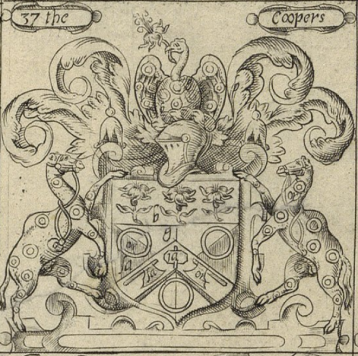
|
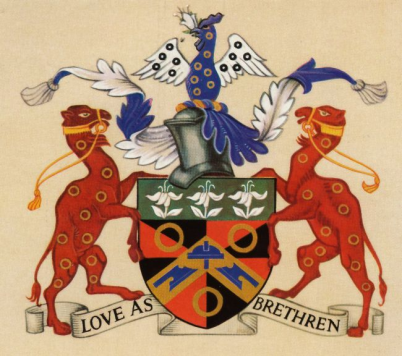
|
| The armes of all the cheife corporatons [sic] of England, 1596 English (LUNA: Folger Digital Image Collection, STC 26018) | Modern rendition of coat of arms of the Guild of Coopers |
Iberian:[edit | edit source]
1506-1509 Livro do Armeiro-Mor (Livre du Grand Armurier) http://www.vikinganswerlady.com/FTP_Files/1506-1509_Livro_do_Armeiro-Mor_Portugal.pdf
- Maia Chefe (100v): Gules, an eagle sable.
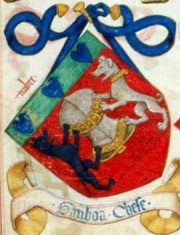
|
Armas | Livro |
| Livro de Armeiro-Mor 1506-1509, blue on green, green on red, black on red, complexity count of 11, dog & wolf | Armas de los Condes, BSB290, 1440-1550, argent on argent, sable on gules | Livro do Armeiro-Mor, 1506-1509, f100v, Maia Chefe, Gules an eagle sable. |
German/Dutch:[edit | edit source]
Regional Exceptions to the Rule of Tincture, Vol. 01 (German) - https://www.facebook.com/notes/sca-heraldry-chat/regional-exceptions-to-the-rule-of-tincture-vol-01/10150677670804203
Regional Exceptions to the Rule of Tincture, Vol. 02 (more German) - https://www.facebook.com/notes/sca-unofficial-heraldic-consultation/regional-exceptions-to-the-rule-of-tincture-vol-02/10150837743659203/
Zurich Roll (http://www.vikinganswerlady.com/]][[@l.php|ZurichRoll/ numbers: 99, 185) File:Zurick-Mandach-99.jpg File:Zurick-Ezelmarx-185.jpg
Counterchanging[edit | edit source]
Per pale sable and gules, two roundels in fess counterchanged. 1475-1500 Wernigeroder Wappenbuch [BSB Cod.icon. 308 n, folio 207r]
Per pale sable and gules, two horns inverted counterchanged, Siebmacher DIE ZIMMER bottom second from left, http://www.wappenbuch.de/pages/wappen_161_Siebmacher.htm
From OSCAR trying to register a sun counterchanged: "There are a few cases of per pale gules and sable or per pale sable and gules with one or two charges of similar complexity:"
- Per pale gules and sable, an eagle counterchanged, from Siebmacher's Wappenbuch, von Radenhausen (http://www.wappenbuch.de/pages/wappen_182_Siebmacher.htm),
- Per pale sable and gules, two hooks addorsed counterchanged, from Siebmacher's Wappenbuch, die Zimmer (http://www.wappenbuch.de/pages/wappen_161_Siebmacher.htm),
- Per pale gules and sable, a wheel counterchanged, from Anton Tirol's Wappenbuch top right, (http://bildsuche.digitale-sammlungen.de/index.html?c=viewer&bandnummer=bsb00001649&pimage=73&v=100&n av=&l=en),
"There are also several examples of sable on gules, or counterchanged low contrast in German heraldry:"
- Gules, a man's head couped affronty sable, from Siebmacher's Wappenbuch, die Tscheterwitz (http://www.wappenbuch.de/pages/wappen_52_Siebmacher.htm),
- Gules, a ram's head sable armed Or, from Siebmacher's Wappenbuch, von Rechenberg (http://www.wappenbuch.de/pages/wappen_52_Siebmacher.htm),
- Per fess gules and azure, a hook counterchanged, from Anton Tirol's Wappenbuch (http://bildsuche.digitale-sammlungen.de/index.html?c=viewer&l=en&bandnummer=bsb00001649&pimage=00143 &v=100&nav=), top right,
https://oscar.sca.org//index.php?action=145&id=67003
From another OSCAR submission for a rose counterchanged: The above submission has images. To view them, see the URLs below:
- Per pale gules and sable, an eagle counterchanged, Siebmacher, https://oscar.sca.org/images/cImages/234/2017-10-21/17-35-54_nur1
- Per pale sable and gules, two hooks addorsed counterchanged, Siebmacher, https://oscar.sca.org/images/cImages/234/2017-10-21/17-35-54_nur2
- Per pale gules and sable, two arms counterchanged holding aloft a crown or, Siebmacher, https://oscar.sca.org/images/cImages/234/2017-10-21/17-35-54_nur3
Ordinaries[edit | edit source]
Gules, a pale sable within a bordure or. #385 zum Angen, Zurich Roll (http://www.vikinganswerlady.com/ZurichRoll/index.html )
Gules, a fess sable charged with three plates. Sammeland, f192
- also in 1540 Anton Tirol's Wappenbuch [BSB 310, f129]
Gules, a fess sable charged with three bezants. 1602-1604 Wappenbuch der Konrad Grünenberg (BSB-Hss Cgm 9210, p287, f305)
Gules, on a fess sable HC tertiaries, 1400s Wappen Deutscher Geschlechter [BSB Cod.icon. 311, f27r]
Gules, a fess sable and overall a crescent and decrescent argent. Fyernacher, Ingeram Codex. http:commons.wikimedia.org/wiki/File:Ingeram_Codex_017.jpg
Gules, a bend sable charged with three towers argent. 1602-1604 Wappenbuch der Konrad Grünenberg [BSB-Hss Cgm 9210, f203, p193]
Gules, on a bend wavy sable three fish haurient argent. Dye Schencken von Sumern. Ingeram Codex. http://commons.wikimedia.org/wiki/File:Ingeram_Codex_173.jpg
Per pale sable and argent, a pale per pale sable a fess gules and gules a fess argent. Her Syegmut Seberacher, Ingeram Codex. http:commons.wikimedia.org/wiki/File:Ingeram_Codex_018.jpg
Per fess gules and argent, in canton on an escutcheon sable a cross argent. 035r Euert Daysij. Wapenboek Beyeren [1581]. http://www.kb.nl/bladerboek/wapenboek/
Sable, a lion Or and overall a bend gules. Sammelband, f179.
Per pale sable a fess gules and argent. Turnbacher, Ingeram Codex. http://commons.wikimedia.org/wiki/File:Ingeram_Codex_206.jpg
Sable, a lion argent and a chief gules. 1602-1604 Wappenbuch der Konrad Grünenberg [BSB-Hss Cgm 9210, f360?, p302]
Wapenboek Beyeren [1581]. http://www.kb.nl/bladerboek/wapenboek/
- Sable, a lion Or, overall a bend gules. 029v Jan die bastert van Brabant.
- Sable, three towers argent, for augmentation on a canton gules, a comb? Or. 042r her Geldoff van Zenne.
- Sable, a lion rampant Or, overall on a bend gules three annulets sable. 038r die heere van Loncamp.
Simple Geometric Charges[edit | edit source]
Per fess gules and argent, three mullets counterchanged sable and gules. 1540 Anton Tirol's Wappenbuch [BSB 310, f111]
Gules, three round-things (gunstones? see below). 1602-1604 Wappenbuch der Konrad Grünenberg, BSB-Hss Cgm 9210, p 312, folio 332 NOT 340.
Gules, three gunstones each charged with a plate within an annulet argent. 64r Polenberg, Sammlungen. [[1]]
Gules crusilly sable, a bend argent. 027r die heer van Pois. Wapenboek Beyeren [1581]. http://www.kb.nl/bladerboek/wapenboek/
Per pale sable and gules, two roundels in fess counterchanged. 1475-1500 Wernigeroder Wappenbuch [BSB Cod.icon. 308 n, folio 207r]
Complex Inanimate Charges[edit | edit source]
Gules in base a cauldron sable lidded Or. Bartenschlager Band 3, Hafen, http://www.stadtarchiv-schaffhausen.ch/Schaffhausen-Geschichte/Genealogie/Register/Bartenschlager_3/Hafen.html
[[File:https://fbcdn-sphotos-c-a.akamaihd.net/hphotos-ak-xaf1/v/t1.0-9/10801834_10152772591619401_2615250110049767619_n.jpg?oh=141e6da17bc67fd32678cd6fbda2c584&oe=555837C1&gda=1432054133_934127e09c9238e78779179c37a96bf8|right|Swiss]]
Gules, three buckles in bend sable. 1602-1604 Wappenbuch der Konrad Grünenberg, BSB-Hss Cgm 9210, p 245, folio 264.
Per fess per pale or and sable and gules, in chief a demi-man issuant from the fess line in a gown counterchanged, wearing a torse sable and or, maintaining in dexter hand a bunch of grapes Or, and in base a cauldron sable within a wreath vert. Bartenschlager Band 4, Köchlin: http://www.stadtarchiv-schaffhausen.ch/Schaffhausen-Geschichte/Genealogie/Register/Bartenschlager_4/K%C3%B6chlin.html
Per pale sable and gules, two horns inverted counterchanged, Siebmacher DIE ZIMMER bottom second from left (same as below), http://www.wappenbuch.de/pages/wappen_161_Siebmacher.htm
Per pale sable and gules, two hooks addorsed counterchanged, from Siebmacher's Wappenbuch, die Zimmer (same as above) (http://www.wappenbuch.de/pages/wappen_161_Siebmacher.htm),
Per pale gules and sable, a wheel counterchanged, from Anton Tirol's Wappenbuch top right, (http://bildsuche.digitale-sammlungen.de/index.html?c=viewer&bandnummer=bsb00001649&pimage=73&v=100&n av=&l=en),
Per fess gules and azure, a hook counterchanged, from Anton Tirol's Wappenbuch (http://bildsuche.digitale-sammlungen.de/index.html?c=viewer&l=en&bandnummer=bsb00001649&pimage=00143 &v=100&nav=), top right,
https://oscar.sca.org//index.php?action=145&id=67003
Per pale sable and gules, two hooks addorsed counterchanged, Siebmacher, https://oscar.sca.org/images/cImages/234/2017-10-21/17-35-54_nur2
Complex Animate Charges[edit | edit source]
Gules, a bear sejant erect sable maintaining a vase with three flowers argent. http://www.stadtarchiv-schaffhausen.ch/Schaffhausen-Geschichte/Genealogie/Register/Bartenschlager_5/Neidhardt.html
Gules, a bear rampant contourney sable maintaining an orb azure banded gules and surmounted by a cross Or. Harder Band 3, Gäschlin: http://www.stadtarchiv-schaffhausen.ch/Schaffhausen-Geschichte/Genealogie/Register/Harder_3/G%C3%A4schlin.html
Gules, an eagle rising wings displayed sable armed or. Sammelband, f13.
Gules, a stag trippant sable crowned or. Sammelband, f26.
Gules, a bear rampant sable crowned or. Sammelband, f33.
Gules, an eagle sable. Sammelband, f150.
Gules, in pale a tower argent and an eagle sable (in base?). Sammelband, f152r.
Gules, a pile invected sable. Sammelband, f153.
Gules, an eagle sable crowned and maintaining two annulets in its claws Or. Sammelband, f158
Gules, in fess a tree proper sustained by a hairy Caucasion man furred and crined sable. Sammelband, f202
- also in 1540 Anton Tirol's Wappenbuch [BSB 310, f4]
Gules, a boar's head couped sable armed and holding an arrow in its mouth argent. Sammelband, f212r.
Gules, a fess argent and overall a bear sable sitting on a crown Or and maintaining a key argent. Sammelband, f251.
Gules, an ibex (?) salient sable standing on a mount vert. 1545-1547 Das Ehrenbuch der Fugger [BSB Cgm 9460, f356, p245]
Gules, a bull statant sable with sinister foreleg and horns argent. 1550 Geschlechterbuch der Stadt Augsburg [BSB Cod.icon. 312 b, folio 48]
Gules, a griffon sable armed and crowned Or with wings argent. folio 222r, http:daten.digitale-sammlungen.de/~db/bsb00001755/images/bsb00001755_00445.jpg
Gules, a man's head couped affronty sable, from Siebmacher's Wappenbuch, die Tscheterwitz (http://www.wappenbuch.de/pages/wappen_52_Siebmacher.htm),
Gules, a ram's head sable armed Or, from Siebmacher's Wappenbuch, von Rechenberg (http://www.wappenbuch.de/pages/wappen_52_Siebmacher.htm),
Gules, a sinister arm issuant from sinister chief vested sable trimmed maintaining in the hand a ring Or. Quarters 2&3 of f365 Baie von Boppart in Scheibler http:commons.wikimedia.org/wiki/File:Beier_von_Boppard-Scheibler365ps.jpg
Per pale gules and sable, an eagle counterchanged, Siebmacher, https://oscar.sca.org/images/cImages/234/2017-10-21/17-35-54_nur1
Per pale gules and sable, an eagle counterchanged, from Siebmacher's Wappenbuch, von Radenhausen (same as above?) (http://www.wappenbuch.de/pages/wappen_182_Siebmacher.htm),
Per pale gules and sable, two arms counterchanged holding aloft a crown or, Siebmacher, https://oscar.sca.org/images/cImages/234/2017-10-21/17-35-54_nur3
Sable, a man statant proper robed gules wearing a cap of maintenance gules and ermine, maintaining in dexter hand a key or, upon a trimount issuant from base vert. Bartenschlager Band 4, Keller: http://www.stadtarchiv-schaffhausen.ch/Schaffhausen-Geschichte/Genealogie/Register/Bartenschlager_4/Keller_2.html
Sable, a bull passant gules attired Or. folio 212r http:daten.digitale-sammlungen.de/~db/bsb00001755/images/bsb00001755_00425.jpg
Sable, a lion rampant gules crowned Or. 1602-1604 Wappenbuch der Konrad Grünenberg [BSB-Hss Cgm 9210, f504, p93, Brabant]
Sable, a lion rampant argent headed and langued gules, Walderdorff, Ingeram Codex. http://commons.wikimedia.org/wiki/File:Ingeram_Codex_241.jpg
From OSCAR - "The demonstration of a complex gules primary charge on a sable field is found in the following German armorial examples:
- 1466-1473 Ortenburger Wappenbuch [BSB Cod.icon. 308 u], 212r, http://daten.digitale-sammlungen.de/~db/bsb00001755/image_425
- 1567 Zacharias Bartsch, Wappen Buch Darinen aller Geistlichen Prelaten Herren vnd Landleut
- 1605 Johann Siebmacher's Wappenbuch
https://oscar.sca.org//index.php?action=145&id=41148
Trimounts:[edit | edit source]
- Siebmacher - V. Hinsperg, Gules, a demi (horse/gazelle/goat) Or issuant from a trimount sable. f.210 http://www.wappenbuch.de/pages/wappen_210_Siebmacher.htm
- Siebmacher - Schwartzenburg, Quarterly 1,4 Paly azure and argent, 2,3 Gules, a tower argent upon a trimount sable
- Manesse Codex - Johann von Ringgenberg, Gules, in pale a D-shaped buckle tongue to chief and a tri-mount couped sable
- Siebmacher - f144, Die Rothen, Sable an eagle rising wings displayed argent upon a trimount gules
- Swiss Armorial - Röthlisberger (dated to 1392? trying to confirm) Sable, a latin cross argent issuant from a trimount gules between in chief two mullets of six points Or.
- BSB392d Suddeutchland Armorial, 16th cent - Sable, a griffin argent issuant from a trimount gules.
- BSB392d Suddeutchland Armorial, 16th cent. - Sable, a mullet Or issuant from a trimount gules.
Tertiary Charges:[edit | edit source]
Argent, a bend gules charged in chief with a fleur sable. 1602-1604 Wappenbuch der Konrad Grünenberg [BSB-Hss Cgm 9210, f265, p247]
Argent, on a bend gules three drinking horns sable. Von Gellhorn, Siebmacher, German 1605, plate 55
Argent, on a bend sable three roses gules seeded or. 1400s Wappen Deutscher Geschlechter [BSB Cod.icon. 311], plate 17.
Paly argent and azure, on a chief gules in dexter a mullet sable. 004v her Jan Mulrepas. Wapenboek Beyeren [1581]. http://www.kb.nl/bladerboek/wapenboek/
Wapenboek Beyeren [1581]. http://www.kb.nl/bladerboek/wapenboek/
- Vert, three mascles argent and on a chief paly Or and gules, a crescent sable. 054r Henric van Bergen.
- Argent, three saltires couped gules, on the dexter chief saltire a mullet of six points sable. 040v Willam van Seuenbergen.
- Ermine, two bars gules, on the chief bar a cross crosslet sable. 044r her Reynier van Entijn.
- Argent, on a chief indented gules, in dexter in pale two lions passant sable. 046r her Michiell van Watersoen.
- Or, a lion gules charged on the shoulder with a wheel sable. 014v her Aernt van Moirmont.
- Or, three bars humetty gules, on the chief bar in dexter a mullet of six points sable. 015v Florens van Abele.
Großes Wappenbuch[edit | edit source]
Großes Wappenbuch, enthaltend die Wappen der deutschen Kaiser, der europäischen Königs- und Fürstenhäuser, der Päpste und Kardinäle, Bischöfe und Äbte bis zu den lebenden Repräsentanten zur Zeit der Regentschaft Kaiser Rudolfs II. und Papst Gregors XIII. - Cod.icon. 333 [S.l.] Süddeutschland 1583 - http://codicon.digitale-sammlungen.de/Blatt_bsb00002481,00006.html (collected by Gunnvor silfrahar)
Possibly also: Cardinalis de Comitibus pg. 173 and 228 Dns. Nicolaus archiepiscopus Gnesnensis in regno Poloine. pg. 179 Dns. Hainricus Civitatensis episcopus. pg. 225.
Italian:[edit | edit source]
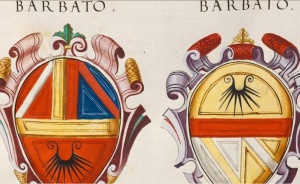
|
Insignia Lucensium |
| Insignia Venetorum nobilium II - BSB Cod.icon. 272 f25r - Italian 1550-1555 | Insignia Lucensium, BSB278 f12r, 16th cent Italian, sable on azure, gules on sable? |
Eastern Europe:[edit | edit source]
Samogitia, Lithuania: Gules, a bear rampant sable collared argent. http://samogitia.mch.mii.lt/ISTORIJA/herbas.en.htm
Telšiai County, Lithuania: Gules, a bear rampant sable collared argent within a bordure azure semy of orthodox crosses Or. http://www.ldm.lt/VPG/Heraldika_1.htm
Vilniaus County, Lithuania: Gules, an armored knight maintaining a spear argent tipped Or and on a shield azure an orthodox cross Or, sejant upon a horse sable furnished azure, within a bordure azure semy of orthodox crosses Or. http://www.ldm.lt/VPG/Heraldika_1.htm
Previous Registration:[edit | edit source]
April 2010 Atlantia Letter of Intent for Murienne l'aloiere - New Device[edit | edit source]
http://oscar.sca.org/index.php?action=145&id=13410 OSCAR finds the name registered exactly as it appears in April of 2010, via Atlantia [under the old Rules for Submission] Gules, three furisons sable. As submitted, the device is in violation of the section of the Society's rules which require that "The field must have good contrast with every charge placed directly on it and with charges placed overall."
The submitter requests that this design, which incorporates three sable non-ordinary charges on a gules field, be considered as a "documented exception" to that requirement under the section of the rules which states that "a proposed exceptional armorial design element may be documented as characteristic of a specific regional armorial style." Under this rubric, current policy requires that the submitted armory may be registered provided that three very specific conditions are met. As any request for a "regional style" exemption tends to get complex fairly quickly, we will attempt to render the argument a bit more comprehensible by taking each of those conditions separately.
The submitter explicitly requests an exception to the other sections of Part VIII (Compatible Armorial Style) on the grounds that the submitted armory exemplifies a specific regional style. The submitter, verbally and in writing through her submitting herald, has specifically requested a "regional style" variance to the Society's contrast requirements.
These requirements are outlined in Part VIII of the Rules for Submission so are specifically eligible for a "documented exception". In point of fact, this is conceptually unexceptional as the original registration of a vert trimount on an azure field which set the ground rules for the current approach to "regional style" exceptions as well as a majority of the "regional style" exceptions granted in the years since have been exceptions to the contrast rules.
The submitter and her herald indicated that they believe that a pattern of sable charges on a gules field is documented from German heraldry which seemed to most commenters an adequately specific "regional armorial style" for the purposes of this requirement. It should perhaps be noted that one commenter with a particular interest in the armory of the German-speaking world as well as eastern Europe noted that a number of the examples originally used in support of the submission "were from Silesia and Austria, which altho' they are German-speaking, are only partially in the German heraldic area". In support of this argument, he provided an article entitled "The Heraldic Provinces of Europe" by Christopher von Warnstedt (The Coat of Arms XI [84]) which notes four primary heraldic "provinces": a "German-Nordic" province which includes Germany, the Scandinavian countries, the Baltic states and north and central Switzerland, a "French-British" province that included north and middle France and the British Isles, a "Latin" province that includes the south of France, Spain, Portugal and Italy, and an "Eastern European Province" which includes Croatia, Hungary, Poland, Lithuania, Russia and Rumania. In addition to this von Warnstedt noted "Border Districts" like Flanders, Bohemia-Moravia, Silesia, etc.
This article is actually very useful for our purposes as von Warnstedt notes that "it might be said that the heraldic system reached its most perfect form - if one prefers its greatest exaggerations - within the French-British province (II) and the border district of Flanders-Brabant-Holland." As this bias rather closely matches those of our traditional reliance on Anglo-Norman armorial traditions, his observations on the stylistic traditions of period Europe are rather useful in evaluating period style.
And, in point of fact, we feel that his observations support our interpretation that a broader view of the German heraldic sphere is reasonable in terms of an appeal to a specific regional style. Not only does he include the Scandinavian countries, the Baltic states and north and central Switzerland in addition to Germany in the "German-Nordic" province, but he also specifically states that Silesia mainly belongs to that province and notes that "the East European coats of arms which appear have often been altered in the German fashion".
Moreover, there appears to have been a rather strong tradition in Society armory of defining armorial regions in the context of "regional style" variations in a broader context (e.g., Iberian armory, German armory) rather than a narrower sphere (e.g., armory from German-speaking Switzerland, Silesian armory), armorial regions that are often defined as much by period or near-period sources available as by other conventions. In other words, there has been a strong tendency to consider all armory appearing in the seventeenth-century Siebmacher Wappenbuch and similar works as coming from a single, reasonably coherent regional style that we tend to refer to generically as "German".
Documentation is adduced to show that exceptional design element was not uncommon in the regional style in question. Examples of similarly complex non-ordinary charges in sable on a gules field abound in German armory. To take only a few readily available examples:
- Von Kreidelwitz ("Gules, a stag's head sable.") from Plate 50 of Johann Siebmacher's Wappenbuch published in 1605 (http://www.wappenbuch.de/pages/wappen_50_Siebmacher.htm).
- Die Czechowski ("Gules a ragged staff sable ensigned of a cross Or.") from Plate 51 of Johann Siebmacher's Wappenbuch published in 1605 (http://www.wappenbuch.de/pages/wappen_51_Siebmacher.htm).
- Die Tscheterwitz ("Gules, A Moor's head sable.") from Plate 52 of Johann Siebmacher's Wappenbuch published in 1605 (http://www.wappenbuch.de/pages/wappen_52_Siebmacher.htm).
- Die Stossel ("Gules, A Moor's head countorny sable.") from Plate 72 of Johann Siebmacher's Wappenbuch published in 1605 (http://www.wappenbuch.de/pages/wappen_72_Siebmacher.htm).
- Die Holtznowsker ("Gules, a wing sable terminating in a bird's foot Or.") from Plate 76 of Johann Siebmacher's Wappenbuch published in 1605 (http://www.wappenbuch.de/pages/wappen_76_Siebmacher.htm).
I On side 11v of a manuscript catalogued and digitized by the Bavarian State Library under the name Wappen deutscher Geschlechter, which contains the bound manuscript BSB Hss. Cod.icon. 311, dated to the fourth quarter of the fifteenth century and believed to derive from the vicinity of Augsburg, one can find a coat which shows "Gules, a hat sable brimmed Or." (http://daten.digitale-sammlungen.de/bsb00001650/image_26).
- Sable on gules and gules on sable can even be found in a counterchange! On side 34r of a manuscript catalogued and digitized by the Bavarian State Library under the name Tirol, Anton: Wappenbuch , which contains the bound manuscript BSB Hss. Cod.icon. 310, dated to the end of the fifteenth century and believed to derive from southern Germany, one can find a coat which shows "Per pale gules and sable, a wagon wheel counterchanged." (http://daten.digitale-sammlungen.de/bsb00001649/image_73). Note that the precise values for the tinctures involved guarantee that this is not a case where original argent metallics have darkened to an apparent sable as has been known to happen in certain heraldic manuscripts!
Since Laurel precedent on "regional style" has tended to be strongly conservative in determining when examples of armory from a particular armorial tradition are similarly simple or complex as compared to a submitted item, it seemed to us advisable to offer as well examples where the complexity of a design goes beyond a single primary charge to involve two or three predominantly or entirely sable charges on a gules field.
- Von Geffen ("Gules, in fess two horns sable.") from Plate 52 of Johann Siebmacher's Wappenbuch published in 1605 (http://www.wappenbuch.de/pages/wappen_52_Siebmacher.htm).
- The arms of the poet Wolfram von Eschenbach, as shown on side 149v of the Manesse Codex (online at http://digi.ub.uni-heidelberg.de/diglit/cpg848/0294) have often been blazoned as "Gules, two cleavers addorsed sable." (see, for example, Coblaith's article "Shields and Escutcheons in the Manesse Codex" online at http://coblaith.net/Heraldry/Manesse/shieldstable2.html).
- The arms of Johann von Ringgenberg, as shown on side 149v of the Manesse Codex (online at http://digi.ub.uni-heidelberg.de/diglit/cpg848/0376) can be blazoned as "Gules, in pale a D-shaped buckle tongue to chief and a tri-mount couped sable." (see, for example, Coblaith's article "Shields and Escutcheons in the Manesse Codex" online at http://coblaith.net/Heraldry/Manesse/shieldstable2.html).
- Die Aver von Tobel ("Gules, in pale three horns fesswise reversed sable.") from Plate 80 of Johann Siebmacher's Wappenbuch published in 1605 (http://www.wappenbuch.de/pages/wappen_80_Siebmacher.htm).
- On side 97v of a manuscript catalogued and digitized by the Bavarian State Library under the name Tirol, Anton: Wappenbuch , which contains the bound manuscript BSB Hss. Cod.icon. 310, dated to the end of the fifteenth century and believed to derive from southern Germany, one can find a coat which shows "Per fess gules and argent, three mullets of six points counterchanged sable and gules." (http://daten.digitale-sammlungen.de/bsb00001649/image_200). (Note that, while the field is an evenly divided tincture, two of the three mullets are sable on a gules field and the overall arrangement of the charges is two and one as in the submitted device.)
- On side 74r of a manuscript catalogued and digitized by the Bavarian State Library under the name Wappenbuch - BSB Cod.icon. 392 d, which contains the bound manuscript BSB Hss. Cod.icon. 392d, dated to the first half of the sixteenth century and believed to derive from southern Germany, one can find a coat which shows "Gules, three Moor's heads contourny sable, heads bound with scarves argent." (http://daten.digitale-sammlungen.de/bsb00018706/image_215).
Documentation is adduced to show that all elements of the submitted armory can be found in the regional style in question. The specific sable on gules issue for which the submitter petitions an exception has been addressed above. Internal commentary was able to provide support for the appearance of the furison (in modern German blazon appearing as Feuerstahl) within the German sphere of influence:
- The arms of Grassauer, which can be blazoned "Gules, a furison argent." appear clearly in the Zurich Roll on Strip II Back Page 8 which can be found reproduced in full at http://www.silverdragon.org/HERALDRY/ZurichRolls/zroadt2r.htm. The arms also appear in a detail clip on the Viking Answer Lady website at http://www.vikinganswerlady.com/ZurichRoll. (The original of the Zurich Roll is generally dated by internal evidence to the middle of the fourteenth century, making it one of the earliest Continental rolls of arms, and the copy from which the digitized images are derived appears to date from the sixteenth century.)
- On side 44v of a manuscript catalogued and digitized by the Bavarian State Library under the name Wappen deutscher Geschlechter, which contains the bound manuscript BSB Hss. Cod.icon. 311, dated to the fourth quarter of the fifteenth century and believed to derive from the vicinity of Augsburg, one can find a coat which shows "Or, a furison sable." (http://daten.digitale-sammlungen.de/bsb00001650/image_92).
- On side 26r of a manuscript likewise catalogued and digitized by the Bavarian State Library under the name Sammelband mehrerer Wappenbücher, which contains the bound manuscript BSB Cod.icon. 391, dated to around 1530 and believed to derive from the vicinity of Augsburg, one can find a coat which shows "Or, a cross between four furisons azure." (http://daten.digitale-sammlungen.de/bsb00007681/image_53).
Most telling, however, in documenting the use of the furison or Feuerstahl in period German armory is an article by Ottfried Neubecker entitled "Die Bedeutung von Feuerstahl und Feuerstein, den Gliedern das Kette des Ordens vom goldenen Vlies" in Volume II of Estudios genealógicos, heráldicos y nobiliarios en honor de Vicente de Cadenas y Vicent (pp. 73ff., which are available on line at http://books.google.com/books?id=utOmTtZlzt8C&pg=PA73&lpg=PA73&dq=Die+Bedeutung+von+Feuerstahl+und+Feuerstein,+den+Gliedern+das+Kette+des+Ordens+vom+goldenen+Vlies&source=bl&ots=u9T0wcPsoE&sig=LPrNIAi-RyBjB3wubt4l9o0fU5I&hl=en&ei=AJvZS_HlEIPA8wSJoPRN&sa=X&oi=book_result&ct=result&resnum=3&ved=0CBEQ6AEwAg#v=onepage&q&f=false). There he notes that the charge appears in the armory of a family In der alten Münze or de Moneta at Strassburg as early as 1334 and possibly as early as 1266 (pp. 74-75). From 1334 as well he notes the arms of Grassauer cited above as well as those of Grebel and Henning von Wodenswegen as containing the charge (p.75). On the same page he notes several families who bore the charge in canting arms, including a German family Stahl who bore "Or, a furison sable.", a Tirolian-Bavarian family Schurff who bore "Azure, a furison Or." and a family by the name of Schurfeisen who bore "Gules, a furison argent.". Neubecker also notes Wilhelm Schurg, an official of the court of the emperor Maximilian I (1459-1519), who used a furison in both his arms and his crest. Not to belabor the point, we will cite only a few more specifically dated examples of armory bearing a furison cited by Neubecker from the German sphere of influence: Johann Schurf or Schurpf from Constance in 1414 who bore "Argent, a sable furison."(p. 76), Konrad Groppenstein from Schöneck 1360-1377 who bore "Gules, a furison argent.") and Konrad Herr in 1584 who bore "Sable, a furison Or."
Taken together, we feel that this evidence not only supports the view that the furison or Feuerstahl occurred in German armory, but may even have been not uncommon for canting arms, given the variety of tincture combinations in which we have found it occurring. Device Comments:
- Someone was concerned that the documentation supported Gules, a <charge> sable, and Gules, two <charges> sable but not Gules, three <charges> sable, unfortunately. They indicated they had seen in period rolls a lot of the first motif, a few of the second, and even Per pale gules and sable, an eagle counterchanged, but not three charges on the field in this color scheme and arrangement...
- Someone else noted that the documentation included Gules, three Moor's heads contourny sable, heads bound with scarves argent and Gules, in pale three horns fesswise reversed sable. It also included Per fess gules and argent, three mullets of six points counterchanged sable and gules.
- Also Johann Siebmacher's Wappenbuch von 1605, p.193 illus 173, Ritterschaft und Adel in Meissen: Lampen: Gules three lamps sable.
